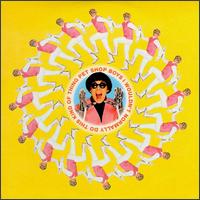
Duran Duran is the seventh studio album and the second self-titled album by English rock band Duran Duran. It was released on 15 February 1993 by Parlophone.

"M.O.R." is a song by English rock band Blur from their eponymous album. Released on 15 September 1997, "M.O.R." reached number 15 in the UK Singles Chart on its release as a single in September 1997. Worldwide, it reached number 45 in New Zealand and also charted in Australia, Canada, and the United States.

"Fake Plastic Trees" is a song by the English rock band Radiohead, released on their second album, The Bends (1995). It was the third single from The Bends in the UK, and the first in the US. It reached the top 50 on the UK Singles Chart, the New Zealand Singles Chart, the US Modern Rock Tracks chart and the Canadian Rock/Alternative chart.

"Serious" is a song by English rock band Duran Duran. It was released on 5 November 1990 as the second single from their sixth studio album, Liberty (1990), reaching number three in Italy and number 48 in the United Kingdom.

"Girls & Boys" is a song by English rock band Blur, released in March 1994 by Food Records as the lead single from the group's third studio album, Parklife (1994). The frontman of Blur, Damon Albarn wrote the song's lyrics with bandmembers Graham Coxon, Alex James and Dave Rowntree, while Stephen Street produced it.

"Too Much Information" is a song by English rock band Duran Duran, released in August 1993 by Parlophone and Capitol as the third single from their seventh studio album, Duran Duran (1993). In the United Kingdom, it became the band's third top-40 single from the album, while in North America, it peaked at numbers 45 and 41 on the US Billboard Hot 100 and Cash Box Top 100, and number 26 in Canada. The accompanying music video for "Too Much Information" was filmed by British director Julien Temple in Santa Monica on 27 August and featured the elaborate stage setup designed for the band's 1993 Dilate Your Mind tour.

"Don't Know Why" is a song written and composed by Jesse Harris that originally appeared on his 1999 album, Jesse Harris & the Ferdinandos. A cover of the song was the debut single of American singer Norah Jones from her debut studio album, Come Away with Me (2002).

"Go West" is a song by American disco group Village People, released in June 1979 by Casablanca Records as the second single from their fourth studio album of the same name (1979). The song was written by Jacques Morali, Henri Belolo and lead singer Victor Willis, while Morali produced it. It was successful in the disco scene during the late 1970s and a top-20 hit in Belgium, Ireland and the UK. "Go West" found further success when it was covered in 1993 by English synth-pop duo Pet Shop Boys.

"Violence of Summer (Love's Taking Over)" is a song by English rock band Duran Duran, released on 23 July 1990 as the first single from their sixth studio album, Liberty (1990). The single reached number two in Italy but fared poorly in other countries, reaching number 20 in the United Kingdom and number 64 in the United States.

"Ordinary World" is a song by English rock band Duran Duran, released in December 1992 by Parlophone, EMI and Capitol as the first single from their self-titled album (1993), commonly known as the Wedding Album. The ballad, both written by the band and co-produced with John Jones, reached No. 1 on the US Billboard Top 40/Mainstream chart, the Canadian RPM 100 Hit Tracks chart, and the Italian Singles Chart. It also peaked at No. 3 on the Billboard Hot 100, No. 2 in Iceland and Sweden, and No. 6 on the UK Singles Chart. The song's music video was directed by Nick Egan and filmed in California.

"I Want You" is a song by Australian pop duo Savage Garden, originally released in Australia on 27 May 1996 as the lead single from their eponymous debut album, Savage Garden (1997). The single reached number one in Canada and peaked at number four in Australia and on the US Billboard Hot 100. Much of the song's chart success in the US was the result of Rosie O'Donnell playing the song on several episodes of The Rosie O'Donnell Show. In the United Kingdom, the single was issued twice, achieving its highest peak of number 11 during its initial release in 1997.

"Will You Be There (In the Morning)" is a song by American rock band Heart. The ballad was written by veteran songwriter and producer Robert John "Mutt" Lange, who was responsible for writing Heart's US number-two single "All I Wanna Do Is Make Love to You" in 1990, and was released as the first single from the band's 11th studio album, Desire Walks On (1993) (although "Black on Black II" was released to radio first). Unlike the majority of Heart songs, which feature Ann Wilson on lead vocals, the lead singer on the song is Nancy Wilson. The song was released in the United Kingdom in November 1993 and in the United States the following month by Capitol Records.

"Domino Dancing" is a song by English synth-pop duo Pet Shop Boys, released in September 1988 by Parlophone as the lead single from their third studio album, Introspective (1988). The song reached number seven on the UK Singles Chart and topped the charts in Finland and Spain. Its music video was directed by Eric Watson and filmed in Puerto Rico.

"On Silent Wings" is a song by American singer-songwriter Tina Turner with guest vocals from English musician Sting. Released in May 1996 in support of Turner's ninth album, Wildest Dreams (1996), the single performed well on the US and Canadian adult contemporary charts, peaking at numbers 24 and 13 respectively. The dance version of "On Silent Wings", remixed by Soul Solution, charted at number 47 on the US Billboard Dance Club Play chart. Like much of Turner's later work, "On Silent Wings" enjoyed greater success in the United Kingdom, peaking at number 13 on the UK Singles Chart.

"Young Boy" is a song by English musician Paul McCartney, included as the fifth track on his 10th solo studio album, Flaming Pie (1997). McCartney reportedly started working on the song in August 1994. The initial tracks were recorded in February 1995 at Steve Miller's studio in Sun Valley, Idaho, and were completed in May at McCartney's home studio. This song and "The World Tonight" were featured in the 1997 movie Fathers' Day.

"Can You Forgive Her?" is a song by English synth-pop duo Pet Shop Boys, released as the first single from their fifth studio album, Very (1993). The lyrics describe in the second person a young man's humiliation when his girlfriend accuses him of still being in love with a childhood friend; the woman is "not prepared to share you with a memory", and is "going to go and get herself a real man instead". The title of the song derives from the Anthony Trollope novel of the same name.

"I Wouldn't Normally Do This Kind of Thing" is a song by English synth-pop duo Pet Shop Boys from their fifth studio album, Very (1993). The song, both written and produced by the duo, describes a person normally hesitant to unwind and show his feelings, who—because of some event in his life—suddenly becomes willing to loosen up. It was released in the United Kingdom on 29 November 1993 by Parlophone as the album's third single, reaching number 13 on the UK Singles Chart. In the United States, where it was released in January 1994, it reached number two on the Billboard Hot Dance Club Play chart. The song's accompanying music video was directed by Howard Greenhalgh.

"Before" is a song by English synth-pop duo Pet Shop Boys, released on 22 April 1996 as the lead single from their sixth studio album, Bilingual (1996). Upon its release, the single peaked at number seven on the UK Singles Chart, number four in Finland, and number one in Hungary. In the United States, it topped the Billboard Hot Dance Club Play chart.

"Single-Bilingual" is a song by English synth-pop duo Pet Shop Boys, released on 11 November 1996 as the third single from their sixth studio album, Bilingual (1996). The track peaked at number 14 on the UK Singles Chart. The song is named "Single" on the album version but was retitled "Single-Bilingual" because Everything but the Girl also had a song named "Single", which had been released the previous May. The album version cross-fades with the previous track, "Discoteca", of which both the album and single versions feature an interpolation at the end.

"Summertime" is a song by English alternative rock band the Sundays. Written and produced by guitarist David Gavurin and lead singer Harriet Wheeler, the song was recorded for the band's third and final studio album, Static & Silence (1997), and released on 8 September 1997 as the first single from the album. Wheeler and Gavurin were inspired to write the song after several of their friends joined a dating service, and the lyrics reflect on how the pursuit of perfect romantic relationships can become taxing.




















